5 Reasons to Stream German Period Drama 'The Empress' on Netflix

Although many of us love period dramas, far too many viewers assume that historical costume drama is strictly the purview of British and/or English-language television. And even these often tend to fall into specific buckets: stories about Tudor England, the Regency period, the Victorian era, or the years surrounding World War II. But the world is wide and there are—or at least there should be—stories from all sorts of eras from all over the world that are worth telling.
This is why I'm here to not only tell you to watch the sumptuous new costume drama The Empress; I'm here to tell you to watch it with the subtitles on. The series follows the dramatic, romantic, and sadly doomed story of the infamous Empress Elisabeth I of Austria, and the churning, changing world she and her husband tried their best to navigate.
The series is a German Netflix Original and stars Turkish-German actress Devrim Lingau as Elisabeth. Best known in Germany for her roles on Carmilla and Auerhas, she's joined by newcomer Philip Froissant, a Munich-born actor who appeared in the 2021 Netflix film Black Island. Other notable cast members include Almila Bagriacik, Wiebke Puls, Elisa Schlott, and Jördis Triebel.
From its instantly likable heroine to its swoony central romance and the backstabbing swirl of court politics that envelope them both, here's why this German import may secretly turn out to be your favorite period drama of the Fall. (And now that it's been renewed for a second season, you have no excuse not to dive right in.)
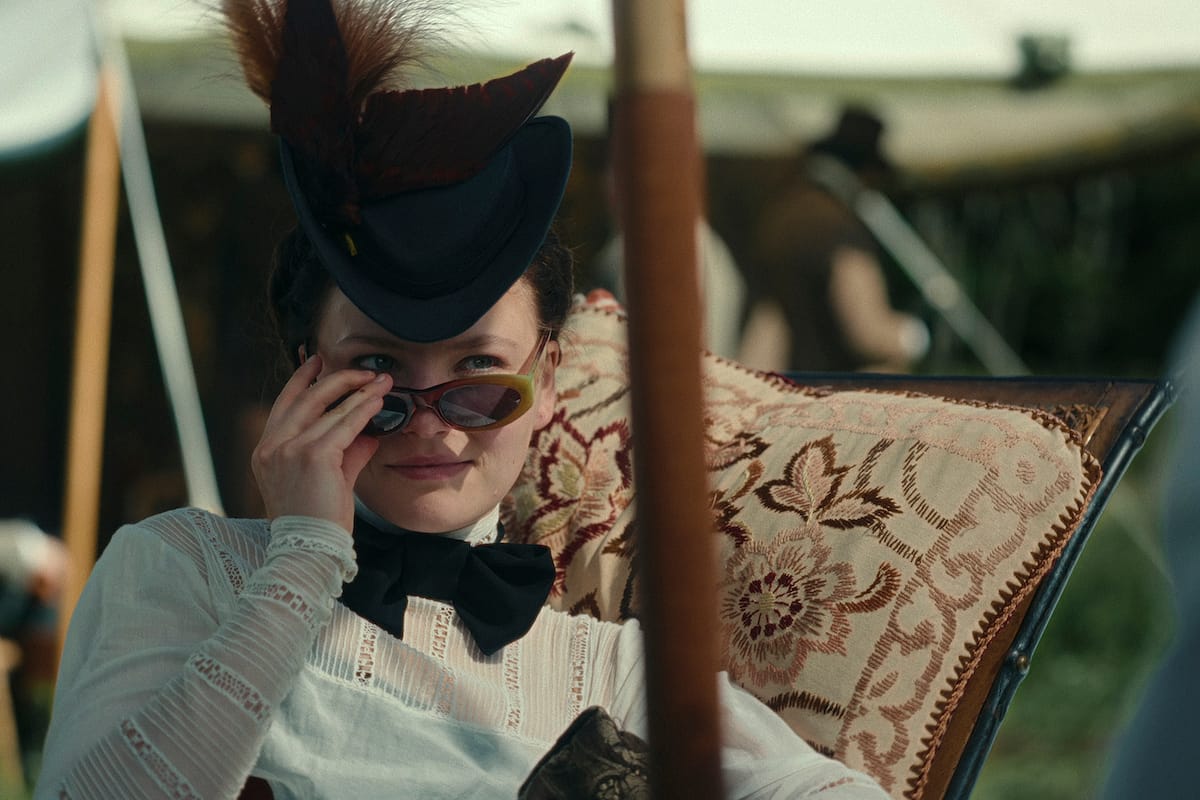
Devrim Lingnau in "The Empress"
A Compelling Heroine
The titular heroine of our tale is Elisabeth of Bavaria—known almost universally as Sisi—a Bavarian duchess turned Austrian empress who marries for love and finds herself forced to navigate a world of intrigue and tension at the Viennese court. And or all that The Empress's Sisi is based on a real person (whose actual life was certainly as dramatic as any fictional story), there's a lot about her onscreen character that feels like it ought to be an archetype. After all, she's a deliberately offbeat sort of duchess: A horse girl who prefers the outdoors to social gatherings, who doesn't want to marry for a social position, and who isn't afraid to speak her mind. This is basically the beginning of how many novels?
But Elizabeth is far and away the best part of this show, a compelling, convincing heroine who's easy to like and almost impossible not to root for. Her various idiosyncrasies are endearing and her forthright attitude is a refreshing change from the double-speak and constant toadying that runs rampant throughout the court. And her refusal to become less simply because her mother-in-law or ladies-in-waiting expect her to is so satisfying to watch.
It can be difficult to make a character like this—someone who is clearly meant to be seen as both sympathetic and good—interesting, but The Empress pulls it off ably, showing us an Elisabeth who is repeatedly frustrated and often desperately unhappy, but who still loves her husband enough to struggle through it. Who's afraid of the world she's willingly stepped into, but refuses to play by its rules. Who repeatedly steps outside of the decorative box she's supposed to inhabit to meet her subjects (most often the poor and downtrodden) where they are. And who genuinely wants to use her position of power to help those that need it, rather than for her own comfort and/or personal enrichment.
Devrim Lingnau makes it so easy to love Elisabeth, and her performance is full of captivating layers. And given the amount of tragedy waiting in this poor girl's future, I can't wait to see what she'll do with that material.
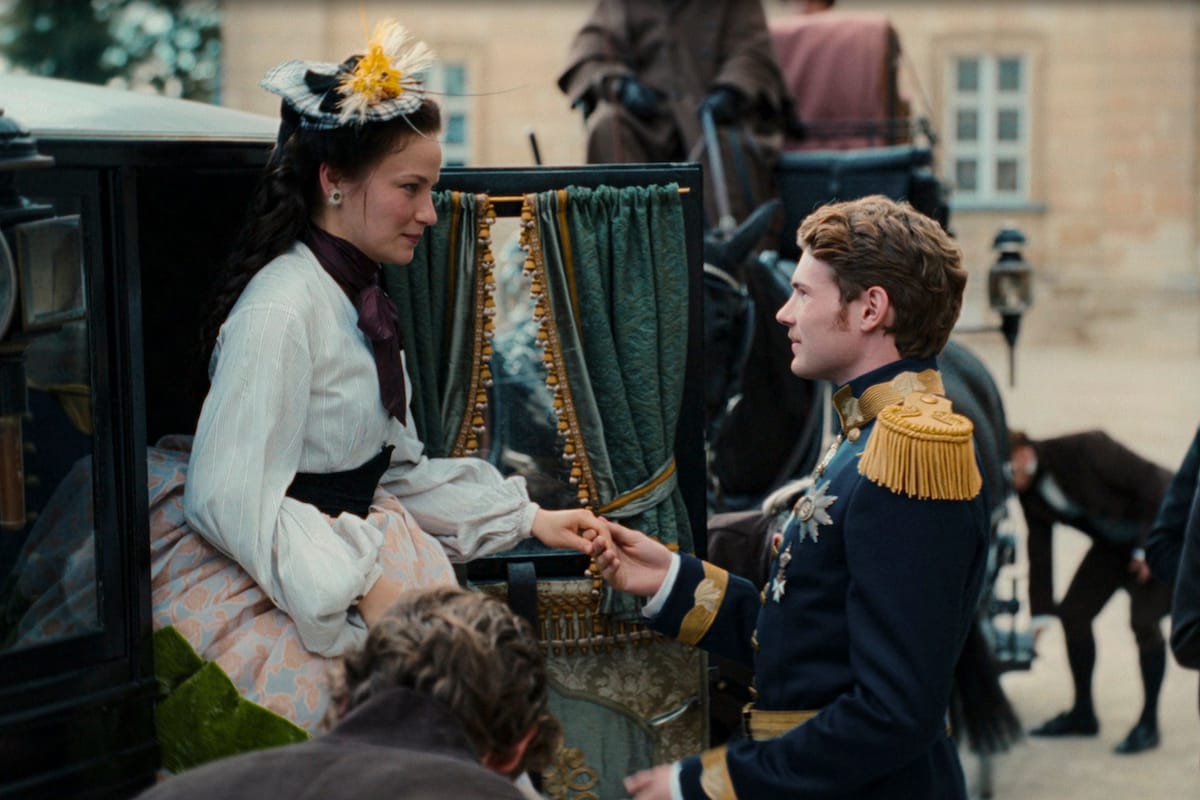
Devrim Lingnau and Philip Froissant in "The Empress"
A Swoony Romance
Although most of her family expected the young Emperor Franz Joseph to propose to her sister, he and Elizabeth were drawn together almost immediately upon meeting one another, and their love would not be denied. The pair married when Elizabeth was just sixteen, thrusting her into a highly public role for which she was wildly unprepared and that she did not particularly like.
Much of The Empress's first season depicts the pair's struggles to adjust to the requirements of royal life and the expectations that come along with it. Outspoken Elisabeth is constantly being chastised for her nontraditional behavior, and Franz's better angels are often overpowered by his domineering mother, Archduchess Sophie.
Yet, despite the various difficulties facing the couple, The Empress never floats the idea that the pair's relationship is in real danger. Yes, they have their problems, some made worse by the situation forced on them as the heads of a royal dynasty and a country in flux. But the show is also very clear that Elisabeth and Franz's love is both genuine and worth fighting for, and doesn't shy away from showing us that the two care for each other desperately, even when they find themselves at odds.
It can often be difficult to make a pre-determined couple appealing; after all, we already know that the two will marry and remain together until Sisi's death. Yet, the show—with a little help from the fantastic chemistry between stars Devrim Lingnau and Philip Froissant—makes their love story feel as though it's dusted with a bit of fairytale magic.
Lingau's offbeat forthrightness is a wonderful foil to Froissant's awkward earnestness, and they're an easy couple to root for, even when they're in overt conflict about what Elisabeth's role in court and political life should be.
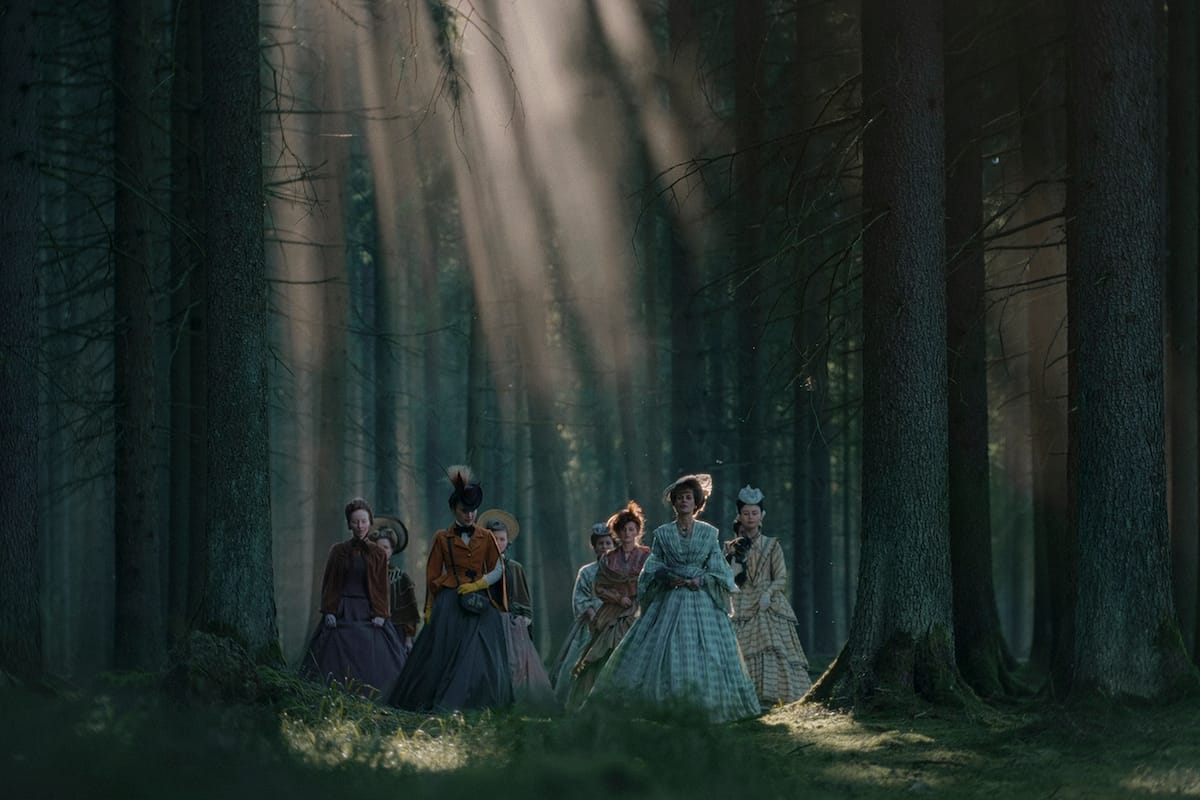
A hunting party
Gorgeous Sets and Costumes
Let's just put it out there, The Empress simply looks incredible.
From the sweeping sets that include the Viennese Hapsburg palace, a lush hunting lodge, and a grand cathedral, the show does its best to recreate a rich world of late eighteenth-century privilege whose opulence sits uncomfortably beside the poverty and poor working conditions of many of its subjects. There's a scene in which Elisabeth visits a local forge making munitions for the army that looks for all the world like she's descending into Hell itself.
Plus, of course, there are the costumes, which are stunning in every sense of the word. From Elizabeth's penchant for tight corsets and colorful, sweeping skirts to her array of dramatic hats, hair accessories, and gigantic sweeping bows, these outfits are next level, and will surely be a great time for all fans of the costume part of "historical costume drama".
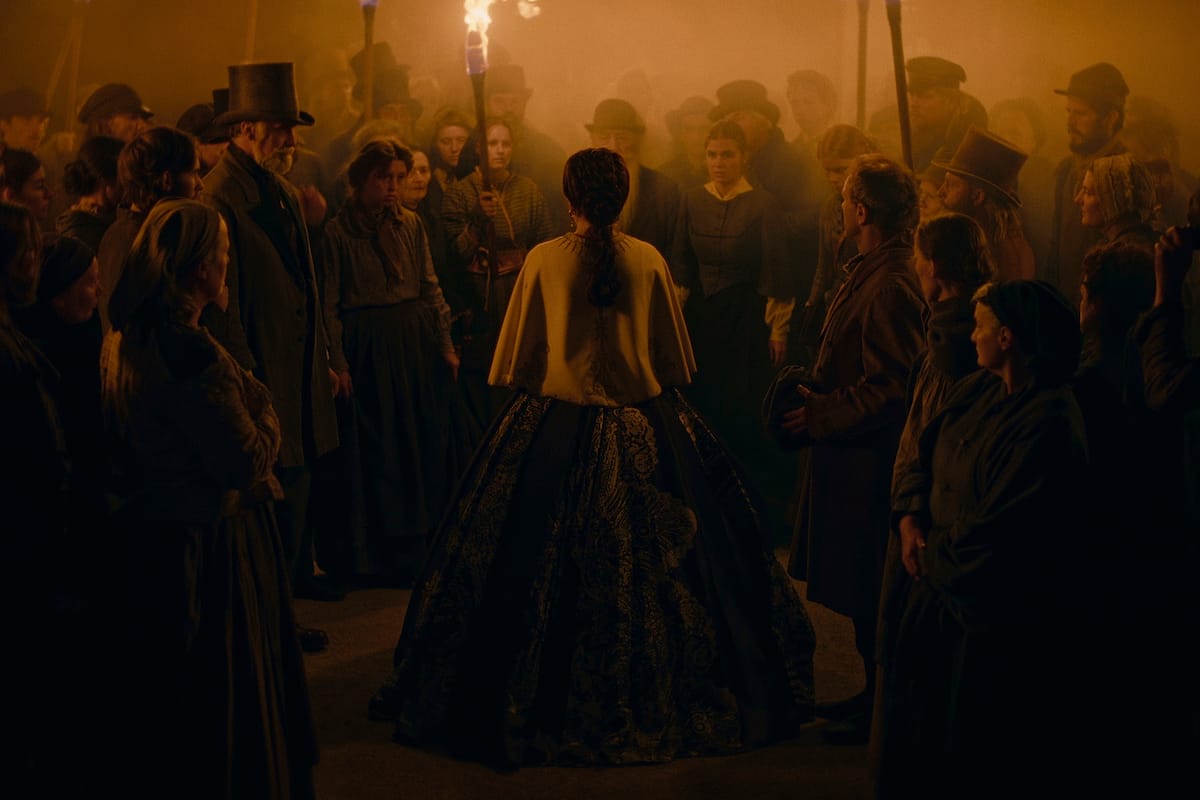
Devrim Lingnau in "The Empress"
Fascinating (If Messy) Political History
Hands up if you too know absolutely nothing about late 19th-century Austria? Or were unaware of the fact that the same Emperor Franz Joseph that married Sisi of Bavaria was the uncle of Franz Ferdinand, whose assassination kicked off World War I? (Or that he became heir to Franz's throne only after his and Sisi's son Rufus died?)
The Empress is about the tumultuous political stage of the late 1800s as it is Franz and Sisi's love story, featuring subplots where war breaks out between Russia and France and Austria struggles to remain neutral between them, even as the threat of revolution grows at home. Franz, for his part, is much more interested in industrialization and infrastructure expansion (his dream project is a railway) than he is in fighting on either front and even when he's forced to send troops to hold the line against invasion, it's apparent that military dominance and/or conquest does not fit into his vision for the future of Austria.
Sisi longs to help the citizens experiencing ever-increasing poverty, inequality, and horrific working conditions, and goes out of her way to both see and treat them as equals. (It's part of the reason she was so popular with the people in a way that her in-laws never quite managed.) She frequently pushes back against the way Sophie, and even Franz to some extent, try to keep her at a distance from the people she's meant to rule, and the season ends with the iconic image of her walking into a crowd armed with literal torches to defuse a dramatic situation outside the palace gates.
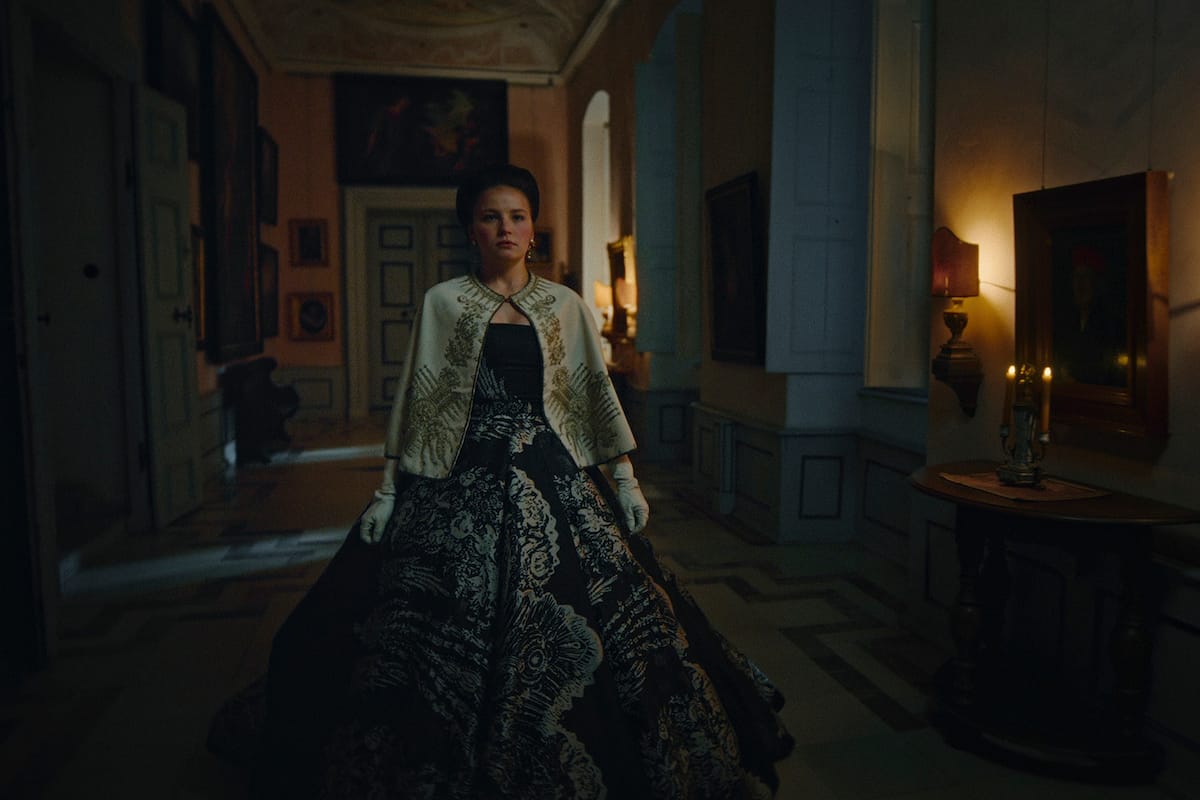
Devrim Lingnau in "The Empress"
Strangely Timely Themes
Although this story of Empress Sisi's life takes place in the early twentieth century, there's plenty about this historical tale that should feel uncomfortably familiar to modern-day audiences. Mostly because her story bears some uncanny resemblances to that of the late Diana Spencer, Princess of Wales.
Elisabeth of Austria also married young into a tumultuous royal family. She too almost instantly captured the imagination of those she was meant to rule, with throngs lining the streets at her wedding, desperate for a glimpse of her and shouting her name, although she was also never a fan of the spotlight of celebrity that came with her royal crown. She had signature jewelry, a contentious relationship with her mother-in-law, and died relatively young, assassinated after being stalked by journalists and crowds for most of her life.
As popular period drama The Crown gears up to launch its fifth season---the one that will ultimately portray the collapse of the Prince and Princess of Wales's marriage and Diana's supposedly fairytale life---The Empress is perhaps nothing so much as a reminded that we've pretty much always treated royal women in the spotlight this way. Which is to say, poorly.
All six episodes of The Empress are now streaming on Netflix.




